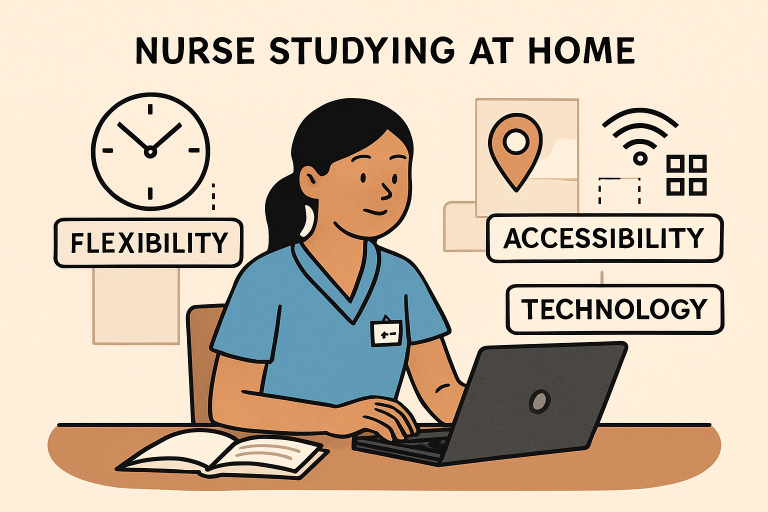Table of Contents
- Introduction
- The Rise of Online Nursing Education
- Benefits of Pursuing Nursing Degrees Online
- Popular Online Nursing Programs
- Integrating Technology in Nursing Education
- Challenges and Considerations
- Conclusion
Introduction
The healthcare sector is evolving at an unprecedented pace, increasing both the challenges and opportunities for dedicated nurses. Education remains the cornerstone of professional growth, and now, nurses have greater options than ever before. Thanks to the rise of digital learning, nurses can further their education without sacrificing their jobs or personal lives. Enrolling in advanced online programs, such as the St Thomas University nursing program, allows working nurses to achieve higher qualifications on their own schedules, opening new doors for leadership, specialization, and increased earning potential.
The flexibility of these programs meets the needs of today’s diverse nursing workforce. As online platforms become more robust, they provide nurses with the opportunity to acquire critical knowledge and practical skills, regardless of their location or workplace. This approach helps bridge the gap for rural or underserved communities seeking to invest in their local healthcare professionals. More than a convenience, online learning is a transformative step for those eager to make an impact in healthcare.
The Rise of Online Nursing Education
Digital advancements have reshaped higher education, particularly in the field of nursing. Many reputable universities now offer wholly online or hybrid programs that deliver a rich, interactive curriculum. For nurses seeking to pursue advanced roles, such as nurse practitioner or healthcare leader, online programs provide accredited courses in specialized fields, flexible learning pathways, and tech-enabled peer collaboration. This evolution supports ambitious nurses at every stage, whether aiming for a Bachelor of Science in Nursing (BSN), a Master of Science in Nursing (MSN), or a Doctor of Nursing Practice (DNP). According to U.S. News & World Report, many of these online nursing programs offer rigorous coursework combined with practical clinical experiences, ensuring graduates are well-prepared for advanced practice and leadership roles. Well-designed online courses not only prepare nurses academically but also instill the tech-savvy mindset required for thriving in modern healthcare environments.
Benefits of Pursuing Nursing Degrees Online
- Flexibility: Online nursing programs enable students to create customized study schedules, balancing coursework with personal and professional responsibilities.
- Accessibility: These programs eliminate geographical barriers, allowing nurses residing in remote or rural locations equal access to high-quality education and esteemed faculty.
- Cost-Effectiveness: In many cases, online degrees are more budget-friendly than traditional, campus-based programs, offering reduced tuition, fewer commuting costs, and digital textbooks instead of costly printed materials.
Furthermore, asynchronous courses enable learners to progress at their own pace. This self-directed structure enables faster completion for motivated students while providing extra time for those who need it, ultimately increasing graduation rates.

Popular Online Nursing Programs
The most sought-after online nursing degrees are tailored to meet the evolving market demands and diverse career ambitions of the nursing community. Among the most popular programs:
- RN to BSN Programs: Tailored for registered nurses who wish to further enhance their skills by earning a Bachelor of Science in Nursing. This degree is now often preferred or required for advancement in hospitals and health systems.
- Master’s Degrees: Advanced degrees, such as Nurse Practitioner (NP) or Nurse Educator, allow RNs to move into specialized clinical roles or academia, supporting the next generation of nurses.
- Doctoral Programs: Doctor of Nursing Practice (DNP) and Doctor of Philosophy (PhD) degrees prepare nurses for executive, research, or academic careers, contributing to the innovation and leadership within healthcare systems.
Integrating Technology in Nursing Education
Technological advancements, such as virtual reality simulations, online discussion boards, and telehealth training modules, are now fundamental to online nursing education. These innovations enable immersive, hands-on learning without requiring physical attendance, preparing nurses to provide care in increasingly automated and virtual clinical settings. These digital tools mirror real-world challenges, helping learners translate virtual knowledge into practical bedside applications.
Challenges and Considerations
Despite the array of benefits, online nursing education is not without obstacles. Success requires strong self-motivation, excellent time management, and the ability to learn independently. Additionally, prospective students must thoroughly research program accreditation to ensure licensing boards and employers recognize the degree. One critical component of nursing education—the clinical practicum—cannot be replicated entirely online. Quality online programs partner with local healthcare facilities to provide hands-on training, ensuring that graduates meet the same rigorous standards as their on-campus counterparts. Choosing the right online nursing program means considering not only flexibility and cost but also support services, faculty expertise, and opportunities for mentorship, which have a direct impact on career outcomes.
Conclusion
In a field defined by constant transformation, advancing your nursing career has never been more accessible. Online education provides a flexible and affordable pathway to new credentials and professional opportunities, propelling nurses into leadership, specialty practice, and research roles. By pursuing a reputable program, such as the St. Thomas University nursing program, nurses are empowered to stay ahead of innovation and lead meaningful change in healthcare for years to come.